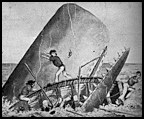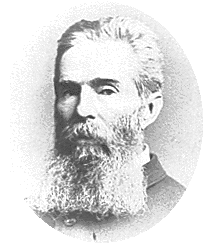Why?
"DEAD WHALE or a STOVE BOAT"?
Something peculiar to the ARMY OF THE PACIFIC is it's yell, "A dead whale or a stove boat!" It has been heard from California to Maryland. How this came about may be of some interest to the reader, especially those who find themselves serving with the AoP for the first time. The word "stove" means "busted."
I first encountered The Whale, by Herman Melville, on the first 25-mile stretch of the "Tidball Trek" (tracing the path of Capt. T.T. Tidball and Co. K, 5th Calif. Inf'y, and Co. A, 1st New Mex. Inf'y in their 1864 scout into the Chiricahua Mountains searching for Apaches). Jay Cooper of the 23d N.Y. read from The Whale (Moby Dick) on at various halts along the march and on Sunday morning. The cry, "A dead whale, or a stove boat!" became that of the 23d, and when assembled, the infectious cry of the ARMY OF THE PACIFIC.

Moby Dick

Herman Melville